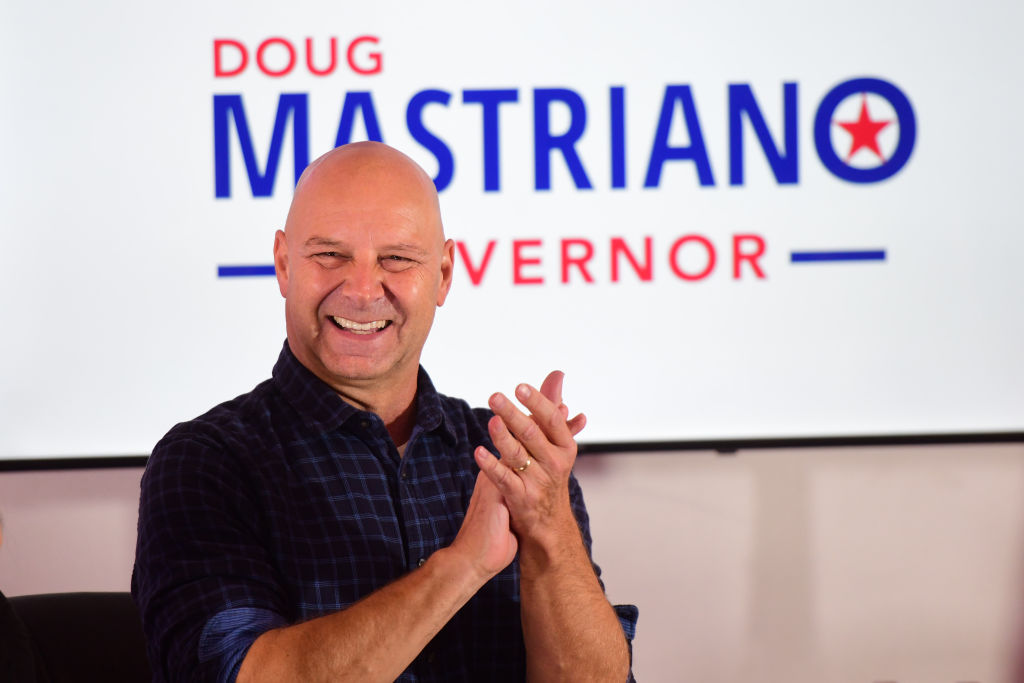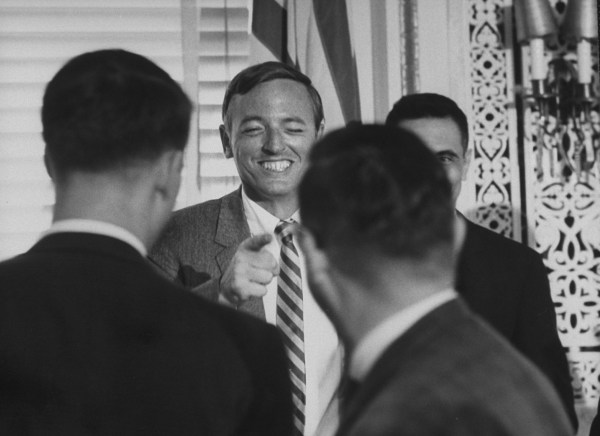Doug Mastriano clawed through his party’s gubernatorial primary with 2020 election denialism and culture war rhetoric to drive more far-right voters to the polls. It worked, and he sailed to victory with 44 percent of the Republican primary vote.
But now the state senator’s refusal to pivot to a general election strategy is raising eyebrows among Republican operatives in the state and deep-pocketed donors outside it. Many say the GOP nominee’s controversial views—including flirtation with antisemitism and no abortion exceptions whatsoever—are alienating independents and moderates, particularly in the suburbs, and have plunged him into a 10-1 fundraising hole against Democrat Josh Shapiro.
One of those critical of Mastriano is Matt Brouillette, CEO of Commonwealth Partners Chamber of Entrepreneurs. Seeing Donald Trump-endorsed Mastriano as a weak general election candidate in the lead-up to the May primary, the Harrisburg-based Republican group invested millions in affiliated super PAC money in two of Mastriano’s primary challengers.
After Mastriano won the primary, Commonwealth Partners gave him a chance to prove he could appeal to independents and moderate Republicans in his bid against Shapiro, the state’s current attorney general. Brouillette says that hasn’t happened. “He has shown us that he hasn’t been serious about winning the key swing voters that you have to learn to be successful in November,” Brouillette said.
During his Election Night party in May, for example, Mastriano told his supporters that the future for Pennsylvania under Shapiro would be “an oppressive regime not unlike East Germany” where “freedoms will be snatched away.” That jolting rhetoric from Mastriano—who chartered buses to the U.S. Capitol on the morning of January 6, 2021—has continued throughout the general election race and has bled into the polls, where Mastriano continues to trail Shapiro by more than 10 points in most recent surveys.
“Voting integrity, we’ve got a long way to go on that,” he told a crowd of supporters last week.
Republicans are also scratching their heads over Mastriano’s apparent disinterest in courting donations from well-funded GOP groups in Pennsylvania and elsewhere. Brouillette hasn’t heard from Mastriano since June. “He hasn’t asked us for any support or money or anything, and I’ve heard that from many others,” said Brouillette, whose organization has launched more than 800 negative ads against Shapiro without endorsing Mastriano.
“If he pulls this off,” Brouiellete said, “it truly will be an act of God.”
The money gap is stunning. By September, Shapiro had raised more than $50 million, dwarfing Mastriano’s roughly $5 million total fundraising haul. In the third-quarter sprint toward Election Day, Shapiro spent $28 million. Mastriano spent less than $1 million.
Nor has Mastriano gotten help from the Republican Governors Association, one of the biggest GOP players in gubernatorial races nationwide. “We don’t fund lost causes and we don’t fund landslides,” RGA Co-Chairman and Arizona Gov. Doug Ducey said last month. “You have to show us something, you have to demonstrate that you can move numbers and you can raise resources.”
Between June and September, Shapiro spent $18 million in television and digital ads alone. Mastriano, who aired none during that period, announced a $1 million ad buy in early October in the final sprint before Election Day.
“When it comes right down to it, it takes money to be successful in any campaign,” said Jackie Kulback, who chairs the Cambria County Republican Party, noting the lack of Mastriano TV ads. “To make up for that, I had a gentleman here today. He wants our help to put an ad in the newspaper and supports Mastriano, so we’re helping him do the graphics on that.”
Mastriano responds to queries about his fundraising gap by describing his campaign as an anti-elite, grassroots effort fueled by small-dollar donations. “We’re relying upon the donations of the people,” he said last week on a radio show. “On the good side—without being philosophical—that does not make me beholden to any special interest group because I think we’re pushing 20,000 individual donations from across the nation.”
In a separate radio interview that aired this weekend, Mastriano addressed criticism from establishment Republicans about his low-budget campaign tactics. “There’s a lot of well-meaning people that have never run for office or a statewide campaign that, you know, have all this great advice: ‘You need to run more TV ads.’ Yeah it’s like, ‘OK, that’s a great idea—how about if you donate and help us do that,’” Mastriano said.
(Mastriano’s campaign declined to comment for this article.)
He maintains his primary strategy—this year’s turnout among GOP voters in the gubernatorial primary nearly doubled 2018’s—will translate to electoral success in the general.
Many Republicans on the ground aren’t convinced. “Doug brought people off the sidelines that weren’t there before,” said one Pennsylvania-based Republican operative, who thinks Mastriano would’ve polled neck-and-neck with Shapiro had he tried to win over voters in the middle. “The grassroots campaign he’s built may be unprecedented—it’s very, very, very impressive. The problem is he hasn’t been able to translate that into talking to swing voters on issues that matter to them.”







Please note that we at The Dispatch hold ourselves, our work, and our commenters to a higher standard than other places on the internet. We welcome comments that foster genuine debate or discussion—including comments critical of us or our work—but responses that include ad hominem attacks on fellow Dispatch members or are intended to stoke fear and anger may be moderated.
With your membership, you only have the ability to comment on The Morning Dispatch articles. Consider upgrading to join the conversation everywhere.